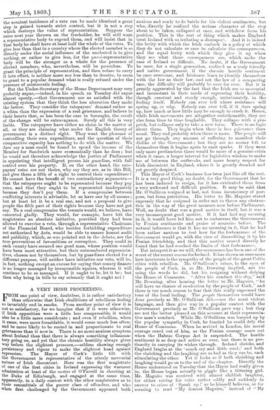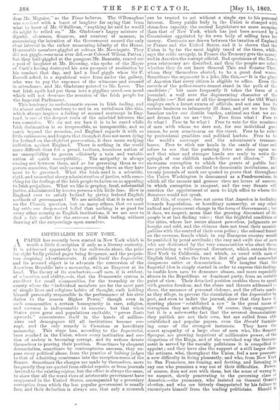A VERY IRISH PROCEEDING.
FROM one point of view, doubtless, it is rather satisfactory than otherwise that Irish ebullitions of rebellious feeling so invariably end in smoke. From another point of view it is not so satisfactory, for we imagine that if it were otherwise, if Irish opposition were a little less compressible, it would also be a little more considerate ; and even if rebellion, when it came, were more formidable, it would come much less often; and be more likely to be rooted in and proportionate to real grievances than it now is. There is no more anxious symptom about Ireland than that there is always something inflammatory going on, and yet that the chronic hostility always gives way before the slightest pressure,—seldom showing enough persistency and vigour to make the slightest head against repression. The Mayor of Cork's little tilt with the Government is representative of the utterly mercurial nature of Irish discontent. Here was the first magistrate of one of the first cities in Ireland expressing the warmest admiration at least of the motive of O'Farrell in shooting at the Duke of Edinburgh, and engaged at the same time, apparently, in a daily contest with the other magistrates as to their committals of the poorer class of offenders, and who when first challenged by the Government appeared both
anxious and ready to do battle for his violent sentiments, but who, directly he realized the serious character of the step about to be taken, collapsed at once, and withdrew from his position. This is the sort of thing which makes England treat Ireland with so irritating a disrespee. And it is indeed the levity with which the Irish embark in a policy of which they do not calculate or care to calculate the consequences, and the equal levity with which they give it up when they see what those consequences are, which make the case of Ireland so difficult. No doubt, if the Government be once, for a single generation, realized as a truly friendly and native government, if the chronic hostile sentiment be once overcome, and Irishmen learn to identify themselves with the law as their law, and not the law of a conquering race, the difficulty will probably be over for ever. But it is greatly aggravated by the fact that the Irish are so mercurial and inconstant in their mode of expressing their hostility, though constant and steady enough, unfortunately, in the feeling itself. Nobody can ever tell where resistance will spring up, or why. Nobody can ever tell, if it does spring up, how much or how little may be enough to crush it. Hence, while Irish movements are altogether unfathomable, they are also from time to time laughable. They collapse with a pinprick, but collapse only to take a new form. There is no logic about them. They begin when there is less grievance than usual. They end probably when there is more. The people will not go through any amount of suffering to manifest their dislike of the Government ; but they are no sooner left to themselves than it begins again to emit sparks. If they were only more pertinacious there would be more of a genuine crisis when it came, a longer interval for legislative wisdom to make use of between the outbreaks, and more hearty respect for Irish discontent in England, where it is greatly dreaded and yet greatly despised. This Mayor of Cork's business has been just like all the rest. It is a very good thing, no doubt, for the Government that he has been induced to resign, for it has extricated them from a very awkward and difficult position. It may be said that Mr. O'Sullivan resigned at last, not from inconstancy of purpose, but from patriotism. His letter to Mr. Maguire stated expressly that he resigned in order not to throw any obstruction in the way of the great measure now before Parliament. Well, no doubt that was a good motive in itself, but it was a very inconsequent good motive. If it had had any meaning in it, it would have led him not to embarrass the Government by Fenian sentiments and praise of assassins before. The natural inference is that it has no meaning in it, that he had been rather anxious to test how far the forbearance of the Government would go, with the view of discrediting it by his Fenian friendship, and that this motive ceased directly he found that he had reached the limits of that forbearance.
But interpret it as we will, the occurrence has been one of the worst of the recent omens forIreland. It has shown us once more how inveterate is the sympathy of the people of the great Celtic cities with rebellion. Mr. O'Sullivan's crime, in the eyes of the people of Cork, is, as Mr. Downing implied, not his using the words he did, but his resigning without defying the House of Commons. "After his conduct this clay," said Mr. Downing, after hearing the letter to Mr. Maguire, "he will have no chance of re-election by the people of Cork," and there is too much reason to fear that this really expressed the tone of the local feeling. The people themselves would have done precisely as Mr. O'Sullivan did,—use the most violent language, and then give way in a popular contest with the Government precisely as Mr. O'Sullivan gave way ; but they are not the better pleased on this account at their representative man's conduct. While Mr. O'Sullivan was buoyed up by the popular sympathy in Cork, he fancied he could defy the House of Commons. When he arrived in London, his moral courage oozed out of him, as the Fenian courage oozes out when the Habeas Corpus Act is suspended. The hostile sentiment is as deep and active as ever, but there is no per tinacity in carrying its wishes through. Ireland shrieks, and England laughs at the much cry and little wool ;' and both the shrieking and the laughing are 28 bad as they can be, each stimulating the other. Yet it looks as if both shrieking and laughing would go on to the end of the chapter. Directly the House understood on Tuesday that the Mayor had really given in, the House began actually to giggle like a tittering girl. Mr. Maguire was received with almost childish laughter, for either raising his voice rather oddly and suddenly in answer to criess of Speak up !' as he himself believes, or for seeming to read "My dearest Maguire," instead of "My dear Mr. Maguire," as the Times believes. The O'Donoghue was received with a burst of laughter for saying that from what be knew of Mr. O'Sullivan, "anything he said he would do might be relied on." Mr. Gladstone's happy mixture of dignity, clearness, firmness, and courtesy of manner, in announcing the intention of the Government caused the only clear interval in the rather unmeaning hilarity of the House. Honourable members giggled at solemn Mr. Newdegate. They did not giggle,—no man ever did,—at Colonel Wilson Patten ; but they half-giggled at the pompous Mr. Bouverie, roared out a peal of laughter at Mr. Downing, who spoke of the Mayor of Cork's having destroyed his own prospect of re-election by his conduct that day, and had a final giggle when Sir P. Burrell asked, in a sepulchral voice from under the gallery, who was to pay the expenses of the witnesses and counsel in attendance, and Mr. Gladstone pointed to Mr. Lowe. The wet Irish squib had put them into a giggling mood,—a mood which will not decrease the aversion of the Irish people for the Imperial Parliament.
This tendency to melodramatic excess in Irish feeling, and its almost uniform tendency to end in an anticlimax like this, which always inspires a feeling of amused contempt in England, is one of the deepest roots of the mischief between the two countries. We do not see how it is to be cured while Irish declamation is so irrepressible, so irresponsible, and so much beyond the occasion, and England regards it with so little seriousness, and forgets that though it does not mean dying for Ireland on the slightest provocation, it does mean undying irritation against England. There is nothing in the world more difficult than for a proud, taciturn, tenacious nation of no susceptibility to govern efficiently a vain and variable nation of quick susceptibility. The antipathy is always coming out between them, and as for governing them as we govern ourselves, that only means governing them as they hate most to be governed. What the Irish need is a scientific, rigid, and somewhat showy administration of justice, with something for the feelings of the Irish people to fasten on as appealing to Irish prejudices. What -we like is groping, local, substantial justice, administered by known persons with little fuss. How is England ever to satisfy Ireland by giving Ireland English methods of government ? We are satisfied that it is not only on the Church question, but on many others, that we must lay aside our deep-rooted belief that nothing is so good for every other country as English institutions, if we are ever to find a fair outlet for the excesses of Irish feeling, without drawing all the outpourings upon ourselves.































 Previous page
Previous page